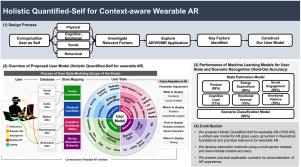Holistic quantified-self for context-aware wearable augmented reality
IF 5.1
2区 计算机科学
Q1 COMPUTER SCIENCE, CYBERNETICS
International Journal of Human-Computer Studies
Pub Date : 2025-06-20
DOI:10.1016/j.ijhcs.2025.103568
引用次数: 0
Abstract
We propose Holistic Quantified-Self for wearable Augmented Reality (HQS-AR), a unified user model for users wearing AR glasses that captures multi-dimensional user states through sensors and interaction data. Despite the growing need for a personalized AR system, unified user modeling in wearable AR remains limited, often leading to suboptimal experiences. To address this gap, we identified key modeling dimensions and their corresponding factors: physical (posture, energy expenditure), cognitive-emotional (cognitive load, emotion), social (social engagement, interpersonal density), and behavioral (device type, usage log). Using motion, visual, audio, behavioral, and physiological datasets, we implemented machine learning models to infer user states and classify scenarios in office environments, achieving an average accuracy of 88% for state estimation and 99% for scenario classification in hold-out validation. Our user model is expected to serve as a state indicator for configuring wearable AR systems and a tool for modeling user routines, advancing personalized AR interfaces.

情境感知可穿戴增强现实的整体量化自我
我们提出了用于可穿戴增强现实(HQS-AR)的整体量化自我,这是一种统一的用户模型,用于佩戴AR眼镜的用户,通过传感器和交互数据捕获多维用户状态。尽管对个性化AR系统的需求日益增长,但可穿戴AR的统一用户建模仍然有限,通常会导致次优体验。为了解决这一差距,我们确定了关键的建模维度及其相应的因素:身体(姿势,能量消耗),认知情感(认知负荷,情感),社会(社会参与,人际密度)和行为(设备类型,使用日志)。使用运动、视觉、音频、行为和生理数据集,我们实现了机器学习模型来推断用户状态并对办公环境中的场景进行分类,在状态估计中实现了88%的平均准确率,在滞留验证中实现了99%的场景分类准确率。我们的用户模型有望作为配置可穿戴AR系统的状态指示器和建模用户例程的工具,推进个性化AR界面。
本文章由计算机程序翻译,如有差异,请以英文原文为准。
求助全文
约1分钟内获得全文
求助全文
来源期刊

International Journal of Human-Computer Studies
工程技术-计算机:控制论
CiteScore
11.50
自引率
5.60%
发文量
108
审稿时长
3 months
期刊介绍:
The International Journal of Human-Computer Studies publishes original research over the whole spectrum of work relevant to the theory and practice of innovative interactive systems. The journal is inherently interdisciplinary, covering research in computing, artificial intelligence, psychology, linguistics, communication, design, engineering, and social organization, which is relevant to the design, analysis, evaluation and application of innovative interactive systems. Papers at the boundaries of these disciplines are especially welcome, as it is our view that interdisciplinary approaches are needed for producing theoretical insights in this complex area and for effective deployment of innovative technologies in concrete user communities.
Research areas relevant to the journal include, but are not limited to:
• Innovative interaction techniques
• Multimodal interaction
• Speech interaction
• Graphic interaction
• Natural language interaction
• Interaction in mobile and embedded systems
• Interface design and evaluation methodologies
• Design and evaluation of innovative interactive systems
• User interface prototyping and management systems
• Ubiquitous computing
• Wearable computers
• Pervasive computing
• Affective computing
• Empirical studies of user behaviour
• Empirical studies of programming and software engineering
• Computer supported cooperative work
• Computer mediated communication
• Virtual reality
• Mixed and augmented Reality
• Intelligent user interfaces
• Presence
...
 求助内容:
求助内容: 应助结果提醒方式:
应助结果提醒方式:


